
Month / December 2006
BSS #89: Nina Hartley
Condition of Mr. Segundo: Harried and henpecked.
Author: Nina Hartley
Subjects Discussed: The meaning of “total sex,” vanilla vs. “alternative” sex, basics vs. options, self-acceptance, foreplay, the relationship between sexual realities and porn film fantasies, the “three position” proclivity, swinging, sexual alienation, responding to Naomi Wolf’s 2003 article, Hooters, extreme porn, porn as education, Jocelyn Elders, Caitlin Flanagan, “death and babies ay-yi-yi!,” spontaneous sex vs. technical know-how, intrapersonal relationships, acceptance, insecurity, and polyamory.
EXCERPT FROM SHOW:
Hartley: I call it “total sex” because it encompasses the mainstay of most sexual practices. It touches on most things pretty well and it leaves plenty of room for exploration of the more esoteric things. I’m a very wide-ranging sexual creature, but I do know that most people are — many people are a little less broad-ranging than I. And so I do try to make it able to speak to the so-called regular person, who is not identified as a quote unquote kinky or freaky or pervert individual, but the regular person who would like to be more comfortable with sex and to get more pleasure out of it in his or her life.
BSS #88: Amy Sedaris
Condition of Mr. Segundo: Ready to party in the Biblical sense.
Author: Amy Sedaris
Subjects Discussed: The lost art of hospitality, Martha Stewart, party theme taxonomy, entertaining old people, profiting from party guests, having a first date in your apartment, how to manage shy people, unexpected guests, remembering guests and logging menus, working with artists, Sedaris’s fear of computers, homemade art, children’s books, opposition to brunch, observing party hosts, the safety of counters, hosting vs. guesting, hosting vs. performing, Jonathan Rauch’s “Caring for Your Introvert,” ruminating vs. writing, communication difficulties, solutions for potheads with bad cases of the munchies, on being misinterpreted, shaking off the Jerri Blank persona, hosting for everyday people, indices, organizing cerebral chaos, being in control vs. delegating, on having too many ideas, the atmosphere within Sedaris’s apartment, and operating by instinct.
EXCERPT FROM SHOW:
Sedaris: I don’t normally have gimmicks and I don’t normally have themes for my parties, but, for the book, I came up with what I thought would be challenging for hostess. Like a hot lunch. And I thought who eats hot lunches? Lumberjacks and grips. So I thought, oh, I’ll have a lumberjack for lunch. Or, you know, if you have a bunch of old people over, just what the hostess has to think about. Or children. Or someone grieving or a depressed person.
Power Litblogger of the Year?
Kevin Sampsell writes: “Ron Hogan at Beatrice.com may have helped sink Judith Regan, but Ed Champion at Edrants.com gets this year’s award. His acidic-yet-informative style is cushioned by an effacing honesty that makes him a joy to scan every day.”
Well, thanks very much, Kevin, but I really don’t know what the hell a “power litblogger” is. Then again, I haven’t yet had a power lunch (at least I think I haven’t), I resort to PowerBars only when Red Bull and coffee aren’t available, and I never really understood Mighty Morphin’ Power Rangers back in the day (and I worked as a movie theater usher the summer that the movie tie-in came out; even after repeat viewings, I still didn’t understand it, even if I lusted after the pink Ranger during weak and lonely moments). I’m thinking that Kevin knows something I don’t, but I’m thankful and more than a bit puzzled all the same.
Besides, Mr. Hogan got pulled (pulled!) from the Judith Regan show. If that ain’t outright “power litblogger,” then I don’t know what is!
(Thanks for the tip, Mr. Brockman.)
No Surprise: NYTBR Slacks Off on Popular Fiction Too
Michael Blowhard observes that the NYTBR is a failure on the popular fiction front as well: “To use an analogy: imagine a movie magazine. It doesn’t announce itself as avant-garde, or as niche in any way. It’s just The New York Review of Movies. It purports, in other words, to be covering movies. You’d expect this magazine to have a point of view — who would even want a publication that’s indiscriminate, after all? But I think it’s fair to say that you’d be surprised if all the movies this magazine gave substantial coverage to were upscale arthouse films.”
And it looks like you can now watch the Book TV segment in its entirety. Levi Asher is correct: the humorless Tanenhaus is about as happy and enthusiastic about books as a chartered accountant is about opening his books to the IRS.
Other highlights (and really this does play like a Christopher Guest mockumentary):
- Dwight Garner is the most personable member of the NYTBR team and knows his stuff (7 minute mark, 14 minute mark & 17 minute mark, et al.)
- Tanenhaus “thinks” that Richard Ford’s Independence Day won the Pulitzer in the 1990s, but isn’t sure (11 minute mark)
- Tanenhaus browbeats poor deputy editor Bob Harris (13 minute mark)
- Tanenhaus actually approximates something close to a smile, clearly an effort that comes as readily as working a twelve-hour shift at a warehouse (16:30)
- Barry Gewen cops to being terrified early in his NYTBR career (17 minute mark)
- Garner wants to find and cover the top literary talents (alas, with his boss not even familiar with basics on Richard Ford, it’s questionable whether Garner’s dream will come true) (17 minute mark)
- Tanenhaus vs. “the stiffs” (“Self-published books we don’t publish. Some day this may change,” “We don’t review a book because it’s already a bestseller,” “We don’t do advice and how-to books, except in the rarest of occasions,” “Sometimes publishers will ask us to reconsider.”) (20 minute mark)
- The discard room (23 minute mark)
- Tanenhaus boasting about having the Saul Bellow Library of America volume early (26 minute mark)
- Tanenhaus: “ambitious” critics read or reread all of an author’s backlist (28 minute mark)
- Gewen notes that not everyone is eager to write for The New York Times (28:30)
- Tanenhaus is a big stickler for polished prose (30 minute mark)
- Tanenhaus: “Among the younger generation of reviewers and critics, [polished prose] is where the tension lies. Because of the blogosphere, because of online publications where there is a tendency to write very quickly and not always thoughtfully and to write sloppily often. Sometimes, it’s hard for those writers to make the transition.” Bullshit, Sam. If you honestly believe that those in the blogosphere cannot slow down or that a writer cannot write polished and fast, particularly when it’s a paid gig, you clearly have no understanding of the blogosphere. (30:30)
- More folderol from Sam: “There are online writers who are brilliant for us. But also we like to offer a range for young and old writers….We also want to be a showcase for distinguished reviewers.” Joe Queenan distinguished? He’s the Bobby Slayton of the book reviewing world: a lowlife thug who let bitterness take over his funny bone years ago. Leon Wieseltier distinguished? Rachel “I Lost My Personality When I Left the Observer” Donadio distinguished? If by distinguished, you mean pretentious bores, then pop open the champagne, Sammy Baby. (31 minute mark)
- Sam goes gaga over Henry Kissinger (31:30)
- “We don’t like ad hominem comments. We don’t like casual assertions. There’s some degree of dignity we try to bring to it.” Yup, now I see why Tanenhaus likes a liar like Kissinger so much. The dirty laundry is now in the spin cycle. (32:30)
- Political books are generally assigned to centrists. (33:30)
- Tanenhaus: “In the world of publishing, more people know Nancy than anyone else in this office.” (34 minute mark)
- Tech templates revealed. (35 minute mark)
- Most art is digital. (37:20)
- The copy editing area. (38 minute mark)
- “We do a great deal of fact checking.” Indeed. I’ll be sure to fact-check you myself once the Tanenhaus Brownie Watch returns. (38:30)
- Debate on the term “shoot the messenger.” What does the reviewer really mean? Maybe relentless questions along these lines are part of the problem. (40 minute mark)
- The Letters page is Tanenhaus’s favorite page. (42 minute mark)
- Alison McCullough editing Dave Itzkoff: “I’m not a sci-fi expert!” (45 minute mark)
- Greg Cowles on blurbs (48 minute mark)
- Tanenhaus likes the hed “Beyond Belief.” (49 minute mark)
- Mick Sussman: online editor and the guy who produces the podcast (“It’s been getting more and more professional, we like to think.”). The online visitors have almost as many visitors as the print edition. (50 minute mark)
- “Mick has been having great luck getting prominent authors.” Amazingly, they have the authors come into the cube-laden NYTBR office or do the interviews by telephone. Well, that explains the lifeless quality of the podcast. And the podcast then gets outsourced to the QXR studio. (In other words, Mick doesn’t even do the cleanup.) By contrast, The Bat Segundo Show is researched, conducted and edited by me, one guy (save, of course, Mr. Segundo), who already has a full-time job and isn’t even in New York. (51:30)
Roundup
- The 50 Greatest Cartoons, with video. (via Kevin Smokler)
- The Times: “Educated people are not supposed to believe in ghosts. This has done nothing to diminish their popularity, at least in fiction.” (via Kenyon Review)
- Children of Men: the book vs. the film.
- The next generation’s vocabulary is, like, diminishing. (via Maud)
- The San Francisco Chronicle offers a list of 2006 deaths, with many authors and journalists. Conspicuously absent are the great talents Octavia Butler and Gilbert Sorrentino, demonstrating that you can win a MacArthur Genius Grant or radically influence experimental fiction and still not earn so much as a sentence from the mainstream media.
- CNN: “A giant ice shelf the size of 11,000 football fields has snapped free from Canada’s Arctic, scientists said.” No global warming, eh? (via Michelle Richmond)
- Israeli literary critic Gershon Shaked has died.
- Reports of the American movie’s death have been greatly exaggerated.
- The excellent 10 Zen Monkeys serves up an overview on world sex laws.
- This week in ridiculous book trailers: Hannibal Rising. (via Ghost in the Machine)
- Kitchen Sink Magazine is folding. (via Warren Ellis)
- Historical Fiction for Hipsters. (via Largehearted Boy)
- Mr. Ewins is going crazy with the top ten lists.
- Reuters’ Mark Porter investigates the ongoing demise of the indie bookstore.
- Print aesthetic pleasantries from Fade Theory.
- Contributors to the New Yorker Winter Fiction issue share their fave books of 2006. Ian McEwan’s faves are particularly interesting.
- “Jack”: “the name of an instrument that supplies the place of a boy.” Well, that’s being a bit coy about a euphemism, Webster.
- Hitch on Gerald Ford.
- A tourist map of Gotham City.
- From earlier this year: Lethem on James Brown. (via Telescreen
- Technorati vs. Google Book Search.
- Well, I, for one, cannot be bribed or have my opinion purchased. Absolutely no price.
The Top Ten Books of 2006
It was a good year. It was very good year. It was the best of times, it was the worst of times. It was the age of Britney’s crotch, it was the age of needlessly angry atheists. It was the epoch of Democratic victory in the two houses, it was the epoch of weak-kneed Democrats and other assorted chucklehead politicians.
I’m not sure if any of the above dualisms have to do with the books that rocked my world this year. But I figure that any end of the year list deserves a needlessly portentous introduction. So without further ado, here are the books that I deem The Best of 2006 in alphabetical order.
(In the interests of total transparency, I should note that I have had email volleys with Richard Powers, Jeff VanderMeer and Sam Savage. But I read their respective volumes before I had any detailed communiques with them. So I don’t feel that my opinions here have been compromised. I should also note that Chris Staros was kind enough to send me a copy of Lost Girls, a quite expensive book, but that this had no bearing whatsoever on why Lost Girls made my list. Indeed, I was skeptical with every book I read this year, particularly the titles with hype attached. But the ones here all managed to win me over, irrespective of the circumstances in which I obtained these tomes.)
 Alison Bechdel, Fun Home: Some cartoonists (including Bechdel, as it turns out) have remarked to me that they often turn to craft of cartooning as a way to make up for deficiencies on the writing and illustration front, often failing to consider that a natural synthesis of these two forms is also a legitimate craft. Fun Home demonstrates an almost total and perhaps subconscious command of the form. Like many good memoirs, it is also a quest of sorts for identity, with many of the lingering questions remaining unanswered. I particularly love how Bechdel’s overly accurate art accentuates the narrative, with the ephemera of notes and books meticulously reproduced in an effort to find a new meaning. The concern for maps, the constant search for structural clues where there may be none, and the way in which even physical gestures sometimes reveal clues about who Bechdel’s father might have been and how these traits carry on into Bechdel’s adult life make this an essential read.
Alison Bechdel, Fun Home: Some cartoonists (including Bechdel, as it turns out) have remarked to me that they often turn to craft of cartooning as a way to make up for deficiencies on the writing and illustration front, often failing to consider that a natural synthesis of these two forms is also a legitimate craft. Fun Home demonstrates an almost total and perhaps subconscious command of the form. Like many good memoirs, it is also a quest of sorts for identity, with many of the lingering questions remaining unanswered. I particularly love how Bechdel’s overly accurate art accentuates the narrative, with the ephemera of notes and books meticulously reproduced in an effort to find a new meaning. The concern for maps, the constant search for structural clues where there may be none, and the way in which even physical gestures sometimes reveal clues about who Bechdel’s father might have been and how these traits carry on into Bechdel’s adult life make this an essential read.
Mark Z. Danielewski, Only Revolutions: I wasn’t surprised to see Danielewski’s latest book dismissed by many as a pretentious artistic experiment. But I don’t believe that these dismissals do Danielewski’s book justice. And there is no way that I can contain my reaction to this book within a paragraph, but I’ll try.
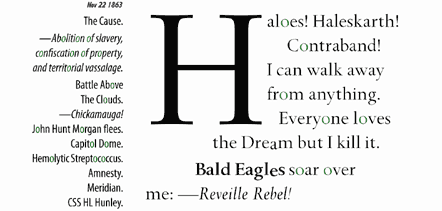 This is not so much a beautiful bauble disguising a thinly plotted road trip across two centuries, as it is a meticulous history of how language affects culture, and vice versa. The arcane words that Danielewski employs (with strange and often hilarious juxtaposition) suggest that those who chronicle culture and history might be missing some vital terminology as we merrily skip along and make our own existential choices. The book’s offbeat vernacular, when examined through a historical prism, reveals an argot that any casual linguist will be compelled to investigate. The accompanying historical tickertape suggests that humanity might be settling for the greatest hits instead of raw specifics. And what better way to highlight human ignorance than for individuals to “go” instead of die or pass on? What’s interesting is how Danielewski has history (such as the 1918 flu epidemic) affect his individuals on a very personal level. Is it possible that the historians are overlooking the visceral consequences of pain and loss as they settle their gaze upon historical scope? Perhaps this is the spirit of revolution contained within this amazing book, which requires great patience and a great curiosity about human interconnectedness. I’d like to think that the real revolutionaries are those who hope to open their eyes to the stragglers it’s acceptable to ignore. I was haunted by this book for days after I finished it, contemplating the ways in which language might be the very code which unlocks human perception.
This is not so much a beautiful bauble disguising a thinly plotted road trip across two centuries, as it is a meticulous history of how language affects culture, and vice versa. The arcane words that Danielewski employs (with strange and often hilarious juxtaposition) suggest that those who chronicle culture and history might be missing some vital terminology as we merrily skip along and make our own existential choices. The book’s offbeat vernacular, when examined through a historical prism, reveals an argot that any casual linguist will be compelled to investigate. The accompanying historical tickertape suggests that humanity might be settling for the greatest hits instead of raw specifics. And what better way to highlight human ignorance than for individuals to “go” instead of die or pass on? What’s interesting is how Danielewski has history (such as the 1918 flu epidemic) affect his individuals on a very personal level. Is it possible that the historians are overlooking the visceral consequences of pain and loss as they settle their gaze upon historical scope? Perhaps this is the spirit of revolution contained within this amazing book, which requires great patience and a great curiosity about human interconnectedness. I’d like to think that the real revolutionaries are those who hope to open their eyes to the stragglers it’s acceptable to ignore. I was haunted by this book for days after I finished it, contemplating the ways in which language might be the very code which unlocks human perception.
Joe Meno, The Boy Detective Fails: Like Sam Savage (whose Firmin also made this year’s list), I believe Joe Meno is very much interested in narrative as a metaphor depicting how playfulness is often at odds with adulthood. To what degree can one escape into a past occupied by a playful and perhaps overly sunny mythology? On the flip side, if one conforms entirely to adult responsibilities, how much of one’s identity and ambition does one lose? Meno raises these questions while giving us a very touching and highly entertaining book (which even comes with a decoder ring and a secret message contained within the footer!). His “Boy Detective,” once a promising Encyclopedia Brown-like character, is now stalled at the age of 30. His detective skills have atrophied and he is faced with crushing responsibilities and demons of the past. Meno surrounds his protagonist with other former child superstars, now working soul-crushing jobs at ratty telemarketing firms and movie theaters, while also offering children with which the playful torch may or may not carry onward. This is no small achievement.
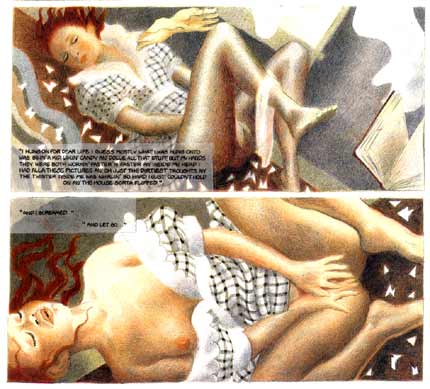 Alan Moore and Melinda Gebbie, Lost Girls: I’m sorry that I was never able to offer a thorough review of this three-volume set, but I shall do my best to offer a precis. One does not approach an Alan Moore volume lightly, even when, in Lost Girls‘ case, it seems as if it’s merely an episodic series of sexual reminiscences. But it is a rare talent who can both titillate and cause one to become slightly uncomfortable at the same time. And this is Moore’s point. It is this dual emotional feeling, the idea that one person’s wicked sexual fantasy might make a person “bad,” that has not only led humans to stifle their possibilities, but perhaps, as juxtaposed against the assassination of Archduke Ferdinand, led them to the brink of war or, with Stravinsky’s “The Rite of Spring,” paganist art which begets paganist behavior. Whether one agrees or is titillated by the fantasies contained with Lost Girls is not the point. The idea here, and it is carried out through many ironic associations of staid narratives (dry letters, often preposterous texts, erotic stories) with unbridled sexual activity, is that humans are in the dark about their true “deviant” nature, pushing these away into fairy tales (why else would Moore pull another Wold Newton on us and give us The Wizard of Oz‘s Dorothy, Peter Pan‘s Wendy, and Alice in Wonderland as his protagonists?) but sometimes not giving themselves the liberty to accept fantasy in their quotidian existences. What then is the true pornographic act? Banning tales that are honest about dark human impulses or denying that they exist? Like the narrator-as-guide that William T. Vollmann often employs in his work, Melinda Gebbie’s beautiful artwork serves as a safety net for the troubled reader, ensuring that the universe that the reader is entering here is a safe and valid place. Moore and Gebbie accomplish all this without coming across as shock artists. I was jesting earlier this year when I suggested that Lost Girls was “fun for the whole family,” but I believe anyone looking to uproot their notions of what is considered “abnormal” might want to give this handsome set a chance.
Alan Moore and Melinda Gebbie, Lost Girls: I’m sorry that I was never able to offer a thorough review of this three-volume set, but I shall do my best to offer a precis. One does not approach an Alan Moore volume lightly, even when, in Lost Girls‘ case, it seems as if it’s merely an episodic series of sexual reminiscences. But it is a rare talent who can both titillate and cause one to become slightly uncomfortable at the same time. And this is Moore’s point. It is this dual emotional feeling, the idea that one person’s wicked sexual fantasy might make a person “bad,” that has not only led humans to stifle their possibilities, but perhaps, as juxtaposed against the assassination of Archduke Ferdinand, led them to the brink of war or, with Stravinsky’s “The Rite of Spring,” paganist art which begets paganist behavior. Whether one agrees or is titillated by the fantasies contained with Lost Girls is not the point. The idea here, and it is carried out through many ironic associations of staid narratives (dry letters, often preposterous texts, erotic stories) with unbridled sexual activity, is that humans are in the dark about their true “deviant” nature, pushing these away into fairy tales (why else would Moore pull another Wold Newton on us and give us The Wizard of Oz‘s Dorothy, Peter Pan‘s Wendy, and Alice in Wonderland as his protagonists?) but sometimes not giving themselves the liberty to accept fantasy in their quotidian existences. What then is the true pornographic act? Banning tales that are honest about dark human impulses or denying that they exist? Like the narrator-as-guide that William T. Vollmann often employs in his work, Melinda Gebbie’s beautiful artwork serves as a safety net for the troubled reader, ensuring that the universe that the reader is entering here is a safe and valid place. Moore and Gebbie accomplish all this without coming across as shock artists. I was jesting earlier this year when I suggested that Lost Girls was “fun for the whole family,” but I believe anyone looking to uproot their notions of what is considered “abnormal” might want to give this handsome set a chance.
Richard Powers, The Echo Maker: I’ve repeatedly sung the hosannas of this book. So I’ll just direct you to what I scribbled over at Mr. Magee’s.
Sam Savage, Firmin: I picked it up at BEA. The only thing I knew about it was that this was a story told from the perspective of a rat. I figured that, at the very least, this would be great airplane reading, something that might serve in lieu of or, if mediocre, in addition to those tiny little bottles they charge you too much money for. After all, the book was slim and, given BEA’s commercial atmosphere, a tale told by a rodent seemed only fitting on the way back to San Francisco.
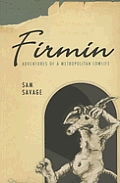 I was entirely unprepared to read a wry and remarkably thoughtful book about the state of imagination in American society. The book had teeth, perhaps a continuously growing set of rodent-like incisors ground to manageable size so that the teeth in question wouldn’t puncture the brain. Sam Savage had kept the page count lean, but certainly hadn’t skimped out on the thoughtful ambiguities beyond it.
I was entirely unprepared to read a wry and remarkably thoughtful book about the state of imagination in American society. The book had teeth, perhaps a continuously growing set of rodent-like incisors ground to manageable size so that the teeth in question wouldn’t puncture the brain. Sam Savage had kept the page count lean, but certainly hadn’t skimped out on the thoughtful ambiguities beyond it.
I don’t believe there’s any way to describe the book without it sounding preposterous, but the book concerns itself with Firmin, a rat who, through mere taste, has the capacity to read literature at an astonishing rate. He scurries through Boston’s infamous Scollay Square, just before the square was cemented over by the City of Boston, attending peep shows and exploring the interconnected buildings, in search of food and in search of meaning. Abandoned by his family and unable to interact with his humans, save through recurrent allusions to people he’s “talked to” at bars, he retreats instead into books, finding solace and a new existence. A pulp science fiction writer named Jerry Magoon takes Firmin under his care, offering compassion and unintentional enlightenment. But residing at the center of all of this is a more troubling dilemma: Firmin is alone and books serve as a way, perhaps the only way, for him to subsist.
The books, however, are Firmin’s downfall, as apocalyptic in nature as Scollay Square’s sad fate and Magoon’s visions. Even from the onset, Firmin cannot settle upon a proper first line to describe his story. That Firmin himself boasts of gorging upon the books instead of understanding what’s inside them suggests a character willing to grope at anything to fight a terrible isolation that he is often vague or disingenuous about. And could it be that the tale we are reading here is not one written by a rat, but one of an outcast so thoroughly ignored by society, that he is reduced to feeding on humanity’s leftovers?
That Savage suggests all this without sacrificing his panache for gallows humor (such as Firmin’s first experience with rat poison pellets) is a testament of his talent. Firmin challenges our narrative assumptions by presenting us with a tale told by a rat, signifying perhaps both nothing and everything, about the relationship between reality and fiction. It can be read as a literal entertainment or a multilayered parable about gentrification and the palliatives and pitfalls of imagination.
Dana Spiotta, Eat the Document: Again, I don’t wish to sound like a broken record, but I direct you to my post from February.
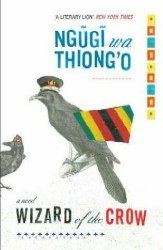 Ngugi wa Thiong’o, The Wizard of the Crow: For whatever reason, and I suspect it had something to do with my mixed feelings about Pynchon’s Against the Day, I didn’t expect to be bowled over by this book. But I found myself greatly enjoying this satire of a postcolonial African dictatorship, which reads, at times, like an epic version of Duck Soup. If you are a fan of comedy that hinges upon cause and effect, then Thiong’o delivers the goods, showing how a squatter’s casual effort to find a place to crash transforms him into “The Wizard of the Crow,” a man loved and feared by the very forces who oppress him. I’ll have more to say about this book, when it’s discussed by the Litblog Co-Op.
Ngugi wa Thiong’o, The Wizard of the Crow: For whatever reason, and I suspect it had something to do with my mixed feelings about Pynchon’s Against the Day, I didn’t expect to be bowled over by this book. But I found myself greatly enjoying this satire of a postcolonial African dictatorship, which reads, at times, like an epic version of Duck Soup. If you are a fan of comedy that hinges upon cause and effect, then Thiong’o delivers the goods, showing how a squatter’s casual effort to find a place to crash transforms him into “The Wizard of the Crow,” a man loved and feared by the very forces who oppress him. I’ll have more to say about this book, when it’s discussed by the Litblog Co-Op.
Scarlett Thomas, The End of Mr. Y: Scarlett Thomas is, as I have suggested many times this year, the contemporary to second wave prodigious fiction authors along the lines of Colson Whitehead. Like Rupert Thomson’s great works, Thomas gives us a very unusual premise (a book which may or may not open up a portal into a strange dimensional universe called the Troposphere) and makes us believe in it. This is not mere faux intellectualism like The Matrix movies, but a thoughtful and entertaining meditation on human decision, human potential, interconnectedness and overthinking that left me crushed at the end. Thomas’s protagonist is a fascinating portrait of contradictions: a young doctoral candidate meekly pursuing intellectual interests yet throwing herself into sordid sexuality and allowing herself to be abused. Don’t listen to Booklist’s Allison Block, who dismissed this novel as “chick lit for nerds.” This is a hell of a lot more, provided that you’re willing to go along for the ride.
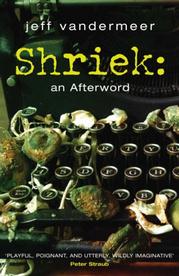 Jeff VanderMeer, Shriek: An Afterword: I must thank Matt Cheney for turning me on to the talented writer Jeff VanderMeer, a man who I had been intending to read for some time. Shortly after Mr. Cheney hooked us up, Mr. VanderMeer surprised me with a prodigious package of his books in the mail and I found myself gleefully lost in his world of Ambergris, a Gormenghast/New Crobuzon-like universe in which humans and mushroom dwellers co-exist with often pernicious results. But it is with Shriek that VanderMeer has truly found his voice, reapproaching his world with a fresh and pleasantly surprising maturity. This is not mere fantasy, but a fascinating hybrid of postmodernism and a reinvention reflecting the turbulent times we now live in. The book features two narrators: Janice Shriek, a parvenu in the art world who casts aspersions on her brother’s underground scholarship. But it is her brother Duncan who gets something of the last laugh, annotating his sister’s revelations with parenthetical comments of his own.
Jeff VanderMeer, Shriek: An Afterword: I must thank Matt Cheney for turning me on to the talented writer Jeff VanderMeer, a man who I had been intending to read for some time. Shortly after Mr. Cheney hooked us up, Mr. VanderMeer surprised me with a prodigious package of his books in the mail and I found myself gleefully lost in his world of Ambergris, a Gormenghast/New Crobuzon-like universe in which humans and mushroom dwellers co-exist with often pernicious results. But it is with Shriek that VanderMeer has truly found his voice, reapproaching his world with a fresh and pleasantly surprising maturity. This is not mere fantasy, but a fascinating hybrid of postmodernism and a reinvention reflecting the turbulent times we now live in. The book features two narrators: Janice Shriek, a parvenu in the art world who casts aspersions on her brother’s underground scholarship. But it is her brother Duncan who gets something of the last laugh, annotating his sister’s revelations with parenthetical comments of his own.
Honorable Mention:
Kate Atkinson, One Good Turn
Richard Ford, Lay of the Land
Edward Jones, All Aunt Hagar’s Children
Claire Messud, The Emperor’s Children
David Mitchell, Black Swan Green
Sarah Waters, The Night Watch
HTML Tomfoolery
Grindhouse Trailer
Trailer. (via The Reverse Cowgirl)
So Much for Mental Health Days
The Daily Mail: “British scientists are on the verge of producing a revolutionary flu vaccine that works against all major types of the disease. Described as the ‘holy grail’ of flu vaccines, it would protect against all strains of influenza A – the virus behind both bird flu and the nastiest outbreaks of winter flu.” (via MeFi)
No Solstice Craving Here, I Assure You
Bad romance covers unearthed at Smart Bitches, Trashy Books.
Wanna Make Money? Take No Chances
Catoosa County News: “Catoosa author Marnie Pehrson was just honored as one of Barnes and Noble’s top 100 best-selling authors….Pehrson adds that her books are also a clean alternative to most romance novels and that they won’t offend someone’s morals.”
Ben, Don’t Oversell It
Ben Macintyre: “Take a look at Tintin’s eyebrows. They are two, single-line half circles, above eyes that are no more than blank holes in a round face. Yet these are some of the most expressive eyebrows ever drawn. Mostly they are raised in permanently enthusiastic expectation; when Tintin is on a mission, they rise and flatten very slightly; when he is amused, one lifts a little higher than the other. The same breadth of expression is true of Captain Haddock’s beard, Snowy’s tail and Professor Calculus’s hat. Even Tintin’s tuft is eloquent.”
Madison Avenue’s Answer to the Forbes 500
The most recognizable brand names in 2006, as ranked by BusinessWeek.
Pledge from Yours Truly
I’ll be less surly tomorrow. It’s one of those days.
Mommy, He Stole My Google Ranking!
Oh, quit your bitchy whining, you goddam blogging prima donnas. Boing Boing, Jason Kottke, Jeffrey Zeldman, Matt Haughey, and the so-called “A-list bloggers” have never once linked to me and you don’t hear me complaining. In fact, I could care less, because placating a solipsist like Jason Kottke is not why I blog.
If you’re in the blogging for the hits and influence and you can’t be troubled to read the goddam information that Google provides which explains in extensive detail how Google indexes its pages, then cry me a sixth ocean. It should be noted that the Google results were more or less restored after the holiday screwup. So the alarmism here is from Technorati crackwhores and Icerocket divas who can’t be troubled to figure out the way the system works and who insist on getting a second slice of birthday cake before everybody else has had their first slice.
Technorati and Google rankings are as fleeting as the sun poking through the clouds in San Francisco. Get used to it.
Guess It Will Be Grays Papaya for Me Then Too
Accept the Unfamiliar
Philip K. Dick, “How to Build a Universe That Doesn’t Fall Apart”: “Do not believe — and I am dead serious when I say this — do not assume that order and stability are always good, in a society or in a universe. The old, the ossified, must always give way to new life and the birth of new things. Before the new things can be born the old must perish. This is a dangerous realization, because it tells us that we must eventually part with much of what is familiar to us. And that hurts. But that is part of the script of life. Unless we can psychologically accommodate change, we ourselves begin to die, inwardly. What I am saying is that objects, customs, habits, and ways of life must perish so that the authentic human being can live. And it is the authentic human being who matters most, the viable, elastic organism which can bounce back, absorb, and deal with the new.” (via Books, Words & Writing)
What is Russell T. Davies Doing to Chase These Great Actors Away?
BBC: “David Tennant is ‘committed’ to Doctor Who, the BBC insists, despite a report that he is leaving the sci-fi drama. The Sun claimed the actor, 35, planned to depart next year, in the middle of the fourth series of the hit programme. But he was currently filming the third series, a BBC spokeswoman said, adding that any episodes beyond that had yet to receive the go-ahead.”
Goodbye Afternoon
The Top Ten Video Moments from 2006, although it seems a major oversight not to include this one.
The Slate Audio Book Club Strikes Again!
2006 wouldn’t be complete without another inept appearance from those dimwitted trendsetters at the Slate Audio Book Club! When last we checked in with the gang, they had moved on from racist generalizations and had declared Michael Pollan’s investigations into how food is prepared and distributed as “yuppie fussiness.” Not to be outdone, these infamous Three Amigos look into Claire Messud’s The Emperor’s Children.
Meghan O’Rourke is sometimes a good critic and the smartest of the bunch (although being smarter than Roiphe and Metcalf is as seminal an achievement as knowing how to speak Pig Latin). But she sounds bored here, unable to muster up a single shred of enthusiasm, which is odd given her enthusiasm for the book in the NYTBR. It’s as if she just emerged from a day of watching Antonioni’s L’Avventura on an endless loop to impress a few friends. She introduces Stephen Metcalf and Katie “Pipsqueak Ph.D.” Roiphe. She offers a plot summary that makes Messud’s splendid novel no fun at all, a noticeable huff in her voice representing one of two possibilities: either she has to spend another hour suffering generalizations from these two assclowns or she’s going to kill multimedia editor Andy Bowers for setting her up with this gig in the first place.
“We’ll get more into the plot because it’s somewhat ornate and elaborate,” huffs O’Rourke.
Did O’Rourke and I read the same book? If by “ornate and elaborate,” you mean a novel that features more than three characters, then I suppose O’Rourke has a point. Perhaps the assumption here made by the Book Club members (and Bowers) is that those listening in to this podcast have an attention span shorter than Warwick Davis. But if she genuinely believes that Messud’s book features a plot that’s difficult to follow, then perhaps she should be leading her fellow Book Club members into a discussion of Jacqueline Sussan’s oeuvre instead of Messud.
Katie Roiphe is the first to chirp in, remarking that the book is just great. Golly! Because first and foremost it’s a page-turner (again, Sussan sounds more her speed) and that Messud has “higher literary aspirations.” And you know, like, maybe there might be “some element of the kind of 19th century novel,” but, like totally, I can’t figure out what it might be. Could it be a novel of manners? That’s what Meghan said. Yeah! That’s 19th century novel, isn’t it? Maybe I can get to Malibu by day’s end and catch some waves.
But here’s Roiphe’s most profound observation: “It does go into their lives in a way that’s deeper than the kind of usual coming-of-age book, which this sort of falls into roughly into the category of.”
Metcalf then emerges into this folderol, offering the smug pronouncement that he found the early portions of the book better than the latter portions. “We can get into why later.” This is the kind of sentence you hear from someone who wants you to believe he knows what he’s talking about, but who hasn’t really thought out his argument.
Falling naturally into the role of smug parvenu, Metcalf then pronounces, “When I liked it most, I was thinking of Edith Wharton. When I liked it less, well, I was thinking of Zadie Smith’s last book. When I liked it least, I was thinking of David Lodge. And I think it oscillates between those three.”
Fantastic, Stephen. Not a single example elucidating why. Just generalizations as usual with random authors tossed around like throw rugs in a bathroom. It says something about Metcalf’s humorlessness that he thinks so little of David Lodge. But then The Emperor’s Children is neither an academic satire nor a sex comedy. Did this guy even read the damn book? Or was this one of those situations where Metcalf read the book the night before with his mouth permanently affixed to a bottle of bourbon?
Amazingly, Roiphe is at least capable of parsing the Anglicized vernacular within the book. (Metcalf finds this a distraction.) But alas, she sees this as a flaw, apparently unfamiliar with the Anglicized bloviators who can be overheard during any three-block walk through Chelsea or the Marina. Alas, Roiphe is more content to flap her maw rather than actually listen or stop to think.
Close to the four minute mark, I had had quite enough of this, particularly when Katie name-checked her dear mama.
The Slate Audio Book Club is a very good idea. But the only way for it to be meaningful is to up the intellectual bar, have the show’s participants offer some kind of enthusiasm, and pair Meghan O’Rourke up with two people who know what the hell they’re talking about.
BSS #87: Simon Winchester
Condition of Mr. Segundo: Ready to drink geologists under the table.
Author: Simon Winchester
Subjects Discussed: San Francisco’s edgy impermanence, San Francisco vs. Venice and the North Sea cities, humankind’s geological privilege, New Orleans & Katrina, the hubris of California residents, anonymous threatening letters, denial vs. geology, Japan and disaster preparation, West Coast subliminal fear, editorial input into Winchester’s work, San Francisco vs. Daly City reactions to the earthquake centenary, Bruce Bolt, the true epicenter of the 1906 earthquake, Jim Tanner, Loma Prieta, subparallel faults, the Parkfield drilling, operating in the geological dark, responding to Bryan Burrough’s NYTBR review and Sam Tanenhaus, the importance of geology, Kevin Starr as an influence, Katrina federal aid vs. 1906 federal aid, looting after the 1906 earthquake, Winchester’s stance on tracking casualties, and defining historical context.
EXCERPT FROM SHOW:
Winchester: The San Francisco event was a minor seismic event, but a major social event and a major scientific event that had huge importance on American history. Because it was the first time in world history that we stopped looking at these catastrophes as the work of a malevolent god and started to look at them as a natural event which should be explained. And so instead of unleashing priests on the problem, which we did in Lisbon in 1755 and after Krakatoa — mullahs there, because it was Islamic — in 1883, we unleashed on the orders of the then Republican Governor of California — Mr. Pardee, a rather dull dentist — we unleashed scientists. And scientists gave us answers. And those answers are of such profound importance that niggling around with whether there were 500 or 50 or 300, whether they were shot, whether they died under falling buildings, whether there was a deaf fireman, are so unimportant. They’re the stuff of tabloid journalism. They’re not the stuff of history.
What I was attempting to grapple with in this book was a historical series of realities, why this was an important earthquake. And whether or not the casualty figures were 1,000 or 5,000 is more or less irrelevant. It was the aftermath, the impact on human society, generally that is important.
Correspondent: So in covering any sort of moment in history, it’s not necessarily the fatality —
Winchester: You don’t cover the moments in history. Journalists cover moments. Historians look back on them with perspective and have, I think, a wider view which does not encompass the tiny details of whether there was a deaf fireman shot. It’s of no consequence whatsoever.
Top O’ The Heap
One thing I love about year’s end is the funky list. 10 Zen Monkeys serves up another: The Worst Vlogs of 2006. (Thanks, David Cassel.)
And speaking of top ten, now that Xmas is past and we’re all paying off our credit cards, my own top ten books list will appear in the next few days.
And now that I’ve conquered the cold, you’ll also be getting some more podcasts that I had hoped to offer before Xmas, as well as the beginnings of the Pynchon roundtable, very soon. Never let it be said that you didn’t have content from me to help you nurse your hangovers.
New Rupert Thomson Novel
I had been holding off on the news until I had more details, but since Megan popped the cherry on this goodness, I’ll simply point you over to Bookdwarf and let you get the skinny yourself: Rupert Thomson’s got a brand new bag in 2007.
It’s safe to say that if you haven’t read Rupert Thomson, you’re missing out big time. Get thee to a bookstore immediately and start with The Book of Revelation. The man’s got the chops and more. You can also listen to his appearance earlier this year on The Bat Segundo Show.
Roundup
- Justine Larbaleister has some good suggestions for oversensitive writers.
- Time Out London lists the top ten children’s books of 2006.
- This morning, when I woke up and heard that Gerald Ford had died and the wind was pattering against my window like something out of a TV disaster movie done on the cheap, I had to call my girlfriend to determine if I was, in fact, operating in reality and not living out some phantasmagorical dream. For several hours, I believed this. But now that I’ve read this item about an “edgy parenting magazine,” I must conclude that either today is preternaturally strange or I am not, in fact, now in the real world. If there’s a doctor out there who might be able to take my pulse during my lunch hour, please let me know.
- Apparently, literary criticism is “cognitive freedom.” If this is the case, I will write my next review assignment in Edward Lear-style nonsense verse and tell my editor that it was because Geoffrey Galt Harpham told me so.
- Jay McInerney is apparently “a boldface name.” Whether this is because McInerney is fond of repeated emphasis of his oenophilia or because his craggy and embarrassing visage still insists that he’s the center of the universe is anybody’s guess.
- Not the “nudie calendar” you’re thinking.
- Schezee Zadi asks the world to remember Urdu poet Perveen Shakir.
- John Heath-Stubbs, the poet who translated the only literary work by a woman from ancient Rome to English, has passed away.
- The Los Angeles Times‘ Josh Getlin suggests that works from Debra Ginsberg and Bridie Clark might represent the next Devil Wears Prada. So let me get this straight: Prada is the new litmus test for confessional fiction? What of Thomas Wolfe or Sinclair Lewis? They both came decades before Lauren Weisberger and it’s safe to say that they both wrote Weisberger under the table. Hell, in Lewis’s case, he wrote much of his fiction while he was under the table.
- The Independent‘s DJ Taylor offers a second look at Richard Bradford’s The Novel Now. You can check out an excerpt of Bradford’s book here.
- Does Pynchon fill in enough literary gaps?
- Otto Penzler: “This is a good time of year to allow yourself to hate someone.” No wonder he’s such a bitter assclown. How does it work for Otto, I wonder? If he hugs you after you give him a gift, does he tear a hunk of meat from your shoulder with his teeth and then stab you in the chest multiple times with an icepick? (via The Dizzies)
- I agree with Tayari. Dreamgirls is worth your time.
- McClatchy has sold off the Minneapolis Star-Tribune.
- Yet a third layout of David Foster Wallace’s “Host” has made its way onto the Columbia University Press site. It’s an improvement upon the version that appeared in Consider the Lobster, but it still pales in comparison to the color-coded version that ultimately appeared in the Atlantic. But I suspect that CUP’s version is a bit easier on the eyes for those who remain bemused. (via Beatrice)
BSS #86: Claire Messud
Condition of Mr. Segundo: Trying to locate his voice.
Author: Claire Messud
Subjects Discussed: Richard Yates’ Revolutionary Road, references to revolution in The Emperor’s Children, Russian literature, Chauncey Gardner in Being There, Dostoevsky, the influences that spawned Bootie, on Messud writing novels outside her generational milieu, responding to Meghan O’Rourke’s review, why Messud didn’t present contrasting ideologies in The Emperor’s Children, hermetic atmosphere, Deborah Solomon and New York media types, Tingle Alley and Infinite Jest, Fort Greene and getting New York neighborhoods right, the influence of decor on character action, preposterous book titles, the cat in Paula Fox’s Desperate Characters vs. the cat in The Emperor’s Children, Anglicized dialogue, fantastic vs. realist environment, cognitive development, The Great Escape, and Anthony Powell.
EXCERPT FROM SHOW:
Messud: I always think of Annabelle as somebody who’s actually out there accomplishing things when nobody’s paying attention. But “revolutionary” is probably too strong a word for [Bootie]. He’s someone who’s going to unsettle things and try to change things. And he comes from a different place: mentally as well as physically. I think that, for me, there’s a tension in the novel, I suppose, between Murray Thwaite, Bootie’s uncle, who is an old-fashioned liberal, and Ludovic Seeley, who is the person to whom the word “revolution” is most often attached. And he is a sort of — a slippery fish. He’s somebody — truth is a changeable thing. Meaning is a changeable thing. What’s good is a changeable thing. And Bootie is somewhere in between these two. And he’s somebody who would like to emulate his uncle and admire his uncle, and finds that when he sees him up close, that he can’t fully do that.
Return to Recipient
If you sent me an email yesterday, please try again. I may not have received it. I’ve just rectified some email issues.
RIP Gerald Ford
¡Roundup Dos!
- Finally, a “Home & Garden” article I can concur with: “An anti-anticlutter movement is afoot, one that says yes to mess and urges you to embrace your disorder. Studies are piling up that show that messy desks are the vivid signatures of people with creative, limber minds (who reap higher salaries than those with neat “office landscapes”) and that messy closet owners are probably better parents and nicer and cooler than their tidier counterparts. It’s a movement that confirms what you have known, deep down, all along: really neat people are not avatars of the good life; they are humorless and inflexible prigs, and have way too much time on their hands.” I vary between a messy desk and a clean desk. I like variety. And the neatniks can go waste their lives spending every spare moment squirting mildew remover around the house. I don’t have time for that OCD shit. Once a week (or two or sometimes three weeks) is good enough for me. (via Pinky & Gwenda; can’t remember where I saw it first so I’ll credit both!)
- Paul Collins is a brave man, but not nearly as brave as Jeffrey Steingarten.
- My copy of The Paris Review Interviews has languished in the TBR pile, but Scott offers some compelling reasons why it’s worth your time. Apparently, Richard Price pitched Clockers to publishers by the conviction of his oral pitch, as opposed to the book in question.
- Someone call PETA!
- So Debbie Weil suggests that if you don’t have multimedia on your weblog next year, you’re “sooooooooo 2006.” I contend that if you have a stiff black and white photo of yourself where you’re really trying to offer a genuine smile but can’t and you end up, as a result, resembling a humorless* realtor to be avoided at all costs, then you’re sooooooooooooo 1986. (via Maxine)
- Mr. Magee has a helpful recap for those who missed his “Year in Reading” series.
- Philip Gourevitch on James Brown. (2002)
- Wait a minute. Michael Orthofer’s actually taking a day off?
- A Conan Doyle Holmes adventure in the Times. (via Book Glutton)
- Bizarre as fuck Terry Pratchett profile. (via Jenny D)
- BookFox observes that the NYTBR finally got around to reviewing What is the What? yesterday — a good two months after the book was released. That’ll show the blogosphere, Tanenhaus! Timely news!
* — Argumentative support for modifier: Ms. Weil believes Six Apart’s bland corporate holiday video to be “funny” when it is nothing less than bullshit marketing.
The “Shake Your Money Maker” Roundup
- Dean Koontz writing Xmas books? Wrong on multiple levels.
- Ngugi wa Thoing’o believes the death sentence handed to his assailants was too harsh. I’ll have more to say about The Wizard of the Crow sooner than you think. (via Critical Mass, which is currently buffeting a train wreck of colossal proportions)
- J.K. Rowling is a domain squatter.
- Darwin’s letters have been auctioned off for a cool £33 million. Unfortunately, the letters in question involve an uninteresting exchange between Darwin and a brash cook harassing Darwin for a recipe for Galapogos Turtle Stew. As any gourmand knows, turtle isn’t a particularly good stew meat. And Darwin had attempted to break this news gently to the cook, pointing out that he had more pressing controversies to deal with, such as the hostile reception to The Origin of Species. But the cook persisted for some months ago, before disappearing altogether. Several Darwin biographers believe that this cook later found a job among a cannibal tribe in New Guinea, where his recipes found greater success. Unfortunately, the cook inevitably sacrificed himself in the name of his calling.
- The Indy Star has some details on Stephen King’s Dark Tower comic adaptation for Marvel.
- If you’re an “aspiring crime novelist,” this might not be the way to conduct research. For the record, I too am an “aspiring novelist,” but there are more effective euphemisms one can use to get laid.
- The Guardian talks with publishers about books that just missed their sales marks.
- Another roundup post later. Still trying to catch up.



